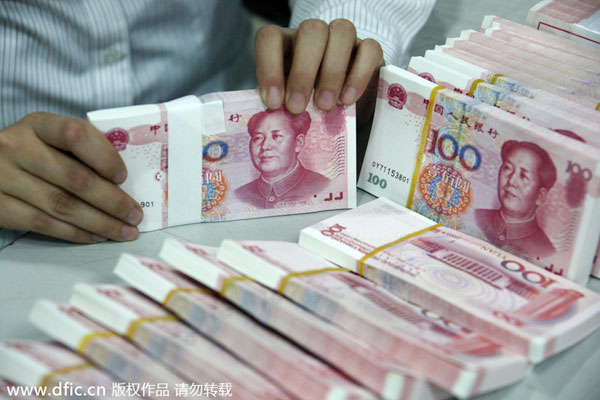 |
|
A clerk counts yuan bills at a bank in Huaibei, East China's Anhui province. [Photo/IC] |
China's decision to allow the renminbi to trade in a wider range against the US dollar will help boost exports and improve use of the currency globally, experts said.
On Friday, the State Council released a policy document, which indicated that the flexibility of the renminbi exchange rate would be enhanced to keep it stable and at an adaptive and balanced level. It, however, did not provide a timing or scope for the potential adjustment.
Wang Shouwen, vice-minister of commerce, said the steps seek to improve the exchange rate mechanism and expand the scale of yuan trade settlements. Currently, a number of countries such as the United States, the United Kingdom and Japan use the exchange rate as an important tool to boost exports. Most of these countries have allowed their currencies to devalue, which in turn has led to a sharp appreciation of the renminbi and seriously affected China's export capabilities.
The real effective exchange rate of the renminbi appreciated by 6.4 percent on a year-on-year basis in 2014 and rose by 4.2 percent in the first quarter of this year, according to a foreign trade report published by the Beijing-based Chinese Academy of International Trade and Economic Cooperation in June.
As China's foreign trade already accounts for a sizable chunk of global trade, the nation may find it difficult to enhance its share further, the report said.
China's exports may see medium or low growth and experience more frequent and stronger fluctuations, and become more vulnerable to impacts from short-term factors like exchange rate swings and dwindling demand.
"Relevant financial institutions will be encouraged to develop more suitable exchange rate hedging tools for the development of the economy and to help Chinese manufacturers avoid exchange rate risks," said Wang.
The European Central Bank has implemented a large-scale quantitative easing policy since March 2015. The Bank of Japan is also following the quantitative easing policy.
The onshore renminbi in the China (Shanghai) Pilot Free Trade Zone is able to diverge up to 2 percent on either side of the daily reference rate set by the central bank. The band was last expanded in March last year from 1 percent, and before that doubled from 0.5 percent in April 2012.
He Jingtong, a professor of economics at Nankai University in Tianjin, said even though the document did not give the exact timing and scope, it shows that the Chinese government is aware that the country's foreign trade development is confronting more challenges such as weakened traditional competitiveness, flagging external demand and increased restrictions.
China's foreign trade stood at 11.53 trillion yuan ($1.86 trillion) in the first half of this year, down by 6.9 percent from the same period a year ago.
The yuan's exchange rate remained stable in the first half, said Wang Chunying, spokeswoman for the State Administration for Foreign Exchange. The daily fix of the yuan-to-US dollar exchange rate, controlled by the central bank, has appreciated by 0.09 percent in the first six months, said Wang.
"Enhancing the flexibility of the yuan exchange rate will help accelerate development of the foreign exchange market and policymakers should be prepared for risk arising from larger fluctuations while allowing the two-way trading of yuan," she said.
Wang Yongli, former vice-president of Bank of China Ltd, said that expanding the yuan's trading range is a step that will deepen exchange rate reform and enable the transition to a more market-determined system. "The reform will increase fluctuations in the exchange rate and increase potential risks in the market," he said.
Contact the writers at zhongnan@chinadaily.com.cn and chenjia1@chinadaily.com.cn
